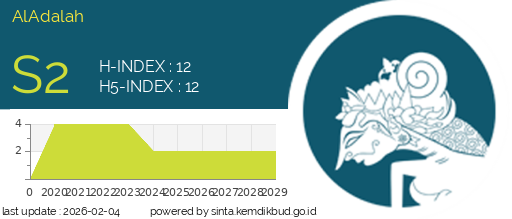Does Artificial Intelligence Go beyond the Limits of Religious Authority? An Ethical Review on IslamGPT
DOI:
https://doi.org/10.35719/aladalah.v27i1.477The rapid advancements in artificial intelligence (AI) have begun challenging the traditional boundaries of religious authority, historically upheld by scholars and clerics. This study examines IslamGPT, an AI platform designed to provide answers on Islamic teachings, and explores its ethical implications within the context of religious authority. While AI, like IslamGPT, offers convenience in accessing religious knowledge, it raises concerns about accuracy, credibility, and the potential erosion of established religious guidance. This article analyzes the ethical dimensions of utilizing AI for religious purposes, emphasizing the need for guidelines to navigate this emerging landscape. The study finds that reliance on AI for religious advice may blur the lines of legitimate authority, highlighting the necessity of direct verification with religious experts to maintain doctrinal integrity. The paper concludes that while AI can support religious education, its use in delivering authoritative religious decisions must be approached with caution, incorporating human oversight to preserve the sanctity of religious teachings.
Downloads
References
Abror, R. H., Adawiah, R., & Sofia, N. (2024). AI threat and digital disruption: Examining Indonesian ulema in the context of digital culture. Journal for the Study of Religions and Ideologies, 23(76), 59–79. https://thenewjsri.ro/index.php/njsri/article/view/437.
Adel, B., Meftah, M. C. E., Laouid, A., & Hammoudeh, M. (2022). Machine learning to classify religious communities and detect extremism on social networks: ML to CRCs and DE through text tweets on SNs. International Journal of Organizational and Collective Intelligence, 12 (1), 1-19. https://doi.org/10.4018/IJOCI.311093
Alharbi, A., Taileb, M., & Kalkatawi, M. (2021). Deep learning in Arabic sentiment analysis: An overview. Journal of Information Science, 47(1), 129–140. https://doi.org/10.1177/0165551519865488
Alkhouri, K. I. (2023). The role of artificial intelligence in the study of the psychology of religion. Religions, 15(3), 290. https://doi.org/10.3390/rel15030290
Amedior, N. C. (2022). Ethical implications of artificial intelligence in the healthcare sector. Advances in Multidisciplinary and Scientific Research Journal Publication 36, 1–12. https://doi.org/10.22624/AIMS/ACCRABESPOKE2023P1
Andriansyah, Y. (2023). The current rise of artificial intelligence and religious studies: Some reflections based on ChatGPT. Millah: Journal of Religious Studies, 22(1), ix–xviii. https://doi.org/10.20885/millah.vol22.iss1.editorial
Aveyard, H. (2014). Doing a literature review in health and social care: A practical guide (3rd ed.). McGraw-Hill Education.
Bloor, M., & Wood, F. (2016). Keywords in qualitative methods: A vocabulary of research concepts. SAGE Publications.
Boddington, P. (2017). Towards a code of ethics for artificial intelligence. Springer.
Cheong, P. H. (2020a). Religion, robots, and rectitude: Communicative affordances for spiritual knowledge and community. Applied Artificial Intelligence, 34(5), 412–431. https://doi.org/10.1080/08839514.2020.1723869
Cheong, P. H. (2021b). Bounded religious automation at work: Communicating human authority in artificial intelligence networks. Journal of Communication Inquiry, 45(1), 5–23. https://doi.org/10.1177/0196859920977133
Creswell, J. W. (2018). Research design: Qualitative, quantitative, and mixed methods approaches (5th ed.). SAGE Publications.
Elmahjub, E. (2023). Artificial intelligence (AI) in Islamic ethics: Towards pluralist ethical benchmarking for AI. Philosophy & Technology, 36(4), 73. https://doi.org/10.1007/s13347-023-00668-x
Haenlein, M., & Kaplan, A. (2019). A Brief history of artificial intelligence: On the past, present, and future of artificial intelligence. California Management Review, 61(4), 5–14. https://doi.org/10.1177/0008125619864925
Hakim, L., & Azizi, M. R. (2023). Otoritas fatwa keagamaan dalam konteks era kecerdasan buatan (Artificial Intelligence/AI). Ar-Risalah Media Keislaman Pendidikan dan Hukum Islam, 21(2),164-174. https://doi.org/10.69552/ar-risalah.v21i2.2101
Harari, Y. N. (2017). Reboot for the AI revolution. Nature 550(7676), 324–327. https://doi.org/10.1038/550324a
Iordan, M.C., Giallanza, T., Ellis, C. T., Beckage, N. M., & Cohen, J. D. (2022). Context matters: Recovering human semantic structure from machine learning analysis of large-scale text corpora. Cognitive Science, 46(2): e13085. https://doi.org/10.1111/cogs.13085
IslamGPT. (n.d.). Quran AI assistant. In IslamGPT (beta). Retrieved March 28, 2024, from https://islamgpt.info
Jackson, J. C., & Yam, K. C. (July 25, 2023). The incredible robot priest and the limits of robot workers. Scientific American. https://www.scientificamerican.com/article/the-in-credible-robot-priest-and-the-limits-of-robot-workers/
Jesson, J. K., Matheson, L., & Lacey, F. M. (2011). Doing your literature review: Traditional and systematic techniques. SAGE Publications.
Jobin, A., Ienca, M., & Vayena, E. (2019). The global landscape of AI ethics guidelines. Nature Machine Intelligence, 1(9), 389–399. https://doi.org/10.1038/s42256-019-0088-2
Karataş, M., & Cutright, K. M. (2023). Thinking about God increases acceptance of artificial intelligence in decision-making.” PNAS Proceedings of the National Academy of Sciences of the United States of America, 120(33), e2218961120. https://doi.org/10.1073/pnas.2218961120
Kaynak, O. (2021). The golden age of artificial intelligence. Discover Artificial Intelligence, 1(1). https://doi.org/10.1007/s44163-021-00009-x
Khoirunisa, A., Rohman, M. F., Azizah, H. A., Arianti, D., Maghfiroh, A. L., & Noor, A. M. (2023). Islam in the midst of AI (Artificial Intelligence) struggles: Between opportunities and threats. Suhuf, 35(1), 26–30. https://doi.org/10.23917/suhuf.v35i1.22365
Masrur, M. (2019, November 12). Uni Emirat Arab meluncurkan aplikasi mufti virtual. Portal Islam Rahmatan lil Alamin, Bincang Syariah. https://bincangsyariah.com/headline/uni-emirat-arab-meluncurkan-aplikasi-mufti-virtual/
McGee, R. W. (2024). A study in artificial intelligence (Working paper). Fayetteville State University https://doi.org/10.13140/RG.2.2.26675.60969
Mitov, A. (2021). Ethical use of artificial intelligence through the utilitarianism perspective (Publication No. 86726). [Bachelor Theses, University of Twente]. University of Twente Student Theses. https://essay.utwente.nl/86726/.
Popova, S. S. (2024). Use of artificial intelligence in the activities of religious associations and control over them. Journal of Digital Technologies and Law, 2(1), 101–22. https://doi.org/10.21202/jdtl.2024.6
Prabowo, D., & Mantalean, V. (Eds.). (2023, September 19). NU: Haram minta fatwa ke ‘artificial intelligence.’ Kompas.com. https://nasional.kompas.com/read/2023/09/19/15551621/nu-haram-minta-fatwa-ke-artificial-intelligence
Pugeda, T. G. S. (2021). Artificial intelligence and ethical reflections from the Catholic church. MST Review, 23(2), 52–93. https://archium.ateneo.edu/theology-faculty-pubs/50
Ransbotham, S., Candelon, F., Kiron, D., LaFountain, B., & Khodabandeh, S (2021, November 2). The cultural benefits of artificial intelligence in the enterprise. MIT Sloan Management Review. https://sloanreview.mit.edu/projects/the-cultural-benefits-of-artificial-intelligence-in-the-enterprise/
Sarinda, F., Martina, M., Noviani, D., & Hilmin, H. (2023). Pendidikan agama Islam berbasis teknologi (AI) Artificial Intelligence. Jurnal Kajian Penelitian Pendidikan dan Kebudayaan, 1(4), 103–111. https://doi.org/10.59031/jkppk.v1i4.268
Sherwood, H. (2016, April 26). Robot monk to spread Buddhist wisdom to the digital generation. The Guardian. https://www.theguardian.com/world/2016/apr/26/robot-monk-to-spread-buddhist-wisdom-to-the-digital-generation
The Qur’an (Sahih International, Trans; English version). (2024). Quran.com. https://legacy.quran.com/3/19
Trotta, S., Iannotti, D. S., & Rähme, B. (2024). Religious actors and artificial intelligence: Examples from the field and suggestions for further research.” Religion and Development, Advance Articles Issue, 1–25. https://doi.org/10.30965/27507955-20230027
Tsuria, R., & Tsuria, Y. (2024). Artificial intelligence’s understanding of religion: Investigating the moralistic approaches presented by generative artificial intelligence tools. Religions, 15(3), 375. https://doi.org/10.3390/rel15030375
Turner, B. S. (2007) Religious authority and the new media. Theory, Culture & Society, 24(2), 117–134. https://doi.org/10.1177/0263276407075001
Weizenbaum, J. (1976). Computer power and human reason: From judgment to calculation. W H Freeman & Co.
Wooldridge, M. (2021). A brief history of artificial intelligence: What it is, where we are, and where we are going. Flatiron Books.
Downloads
Section
License
Copyright (c) 2024 Mohammad Fattahun Niam

This work is licensed under a Creative Commons Attribution-NonCommercial 4.0 International License.
This work is licensed under a Attribution-NonCommercial 4.0 International (CC BY-NC 4.0).

























 Al'Adalah licensed under Creative Commons Attribution-NonCommercial 4.0 International License.
Al'Adalah licensed under Creative Commons Attribution-NonCommercial 4.0 International License.